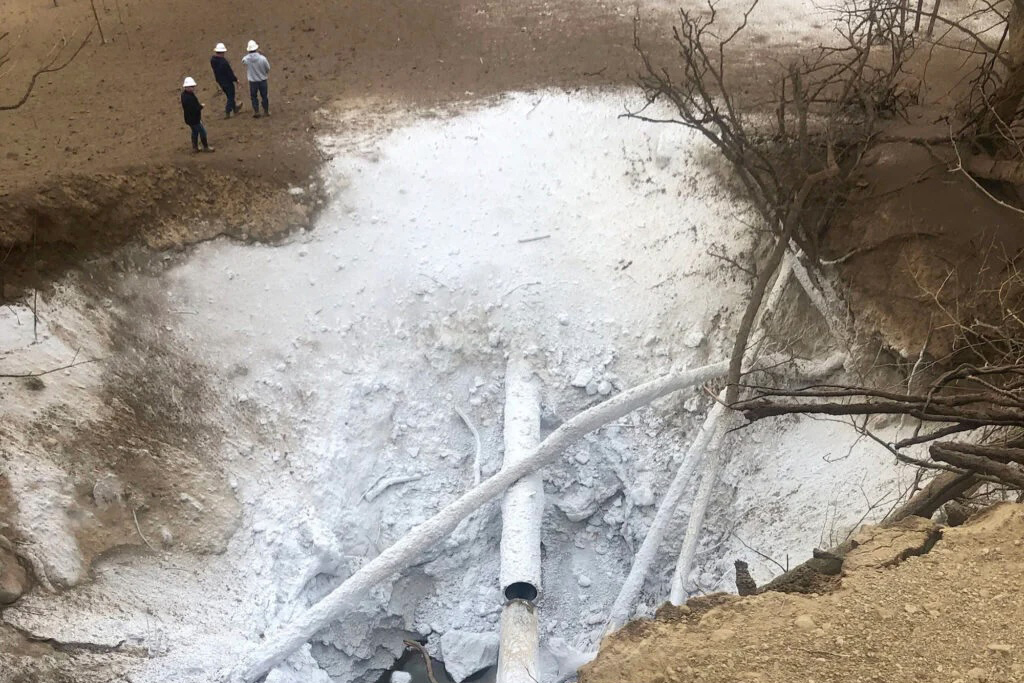Federal inspectors examining a carbon dioxide pipeline under construction to replace one that had failed in Mississippi faced harassment, physical obstruction, and interference, as detailed in a notice from the Pipeline and Hazardous Materials Safety Administration.
The agency is proposing a $2.4 million fine against Denbury, the pipeline company, and its contractor, Republic Testing Laboratories. This significant penalty stands out as the agency typically proposes fines in the tens of thousands. Previously, Denbury agreed to pay a $2.8 million fine for a pipeline rupture in Mississippi, originally set at $3.9 million.
This proposed fine for hindering inspection is the eighth largest since 2002, according to PHMSA data. The findings and proposed fine for the 2023 inspection were issued in January, shortly before President Joe Biden’s term ended. PHMSA declined to comment on the ongoing investigation.
ExxonMobil, the owner of Denbury, acknowledged receiving the PHMSA notice and is considering its response. Republic Testing did not comment. Inspections took place at Republic’s facility in LaPorte, Texas.
The work under scrutiny included welding on a section of pipeline replacing Denbury’s 24-inch pipeline that ruptured near Satartia, Mississippi, in 2020, hospitalizing 45 people.
Bill Caram, executive director of the Pipeline Safety Trust, described the allegations as alarming. “Such blatant disregard for safety oversight is shocking,” he stated. The Satartia incident has been a reference point for opponents of carbon capture technology, deemed unproven and risky by critics.
PHMSA indicates that the U.S. will require 50,000 miles of CO2 pipelines, ten times the current length, to support carbon capture and sequestration (CCS) due to federal tax incentives considering projects nationwide, including the Louisiana and Texas coasts. The technology is crucial for reducing greenhouse gas emissions. Pipelines transport CO2 from capture sites to storage or, as in Satartia, for oil well injection.

However, leaks or ruptures can have severe consequences, as CO2 can be lethal. Denbury owns another pipeline that leaked in Calcasieu Parish, Louisiana, in April 2024, prompting local shelter-in-place orders.
Inspections focus on welds, a common failure point. CO2 pipelines require robust welding to withstand the rapid cooling during decompression, which can weaken inadequate welds.
Allegations of Intimidation Detailed
PHMSA’s report outlines six incidents at Republic’s Texas site from Aug. 30 to Dec. 7, 2023, violating federal law.
On Sept. 6, Denbury and Republic employees blocked and pushed an inspector during an interview with a welder, PHMSA reports. The following day, inspectors were misled about weld strength tests, which were conducted after they had left.
PHMSA alleges Denbury and Republic performed testing without inspectors present. On Sept. 11, an orange screen prevented inspectors from monitoring welding activities, including real-time data logging. A PHMSA inspector was mocked and questioned about their qualifications, resulting in the inspector leaving for safety reasons. Despite requests, the Republic employee involved was not removed and continued in the inspection process.
Denbury also allegedly withheld data and prevented inspectors from photographing equipment readings. Jim Walsh from Food and Water Watch expressed concern about industry trends towards minimal oversight.
Floodlight investigates climate action challenges posed by powerful interests.
Original Story at insideclimatenews.org
